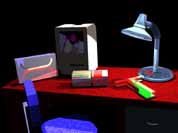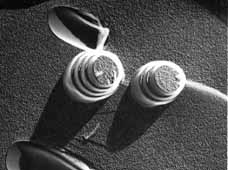 |
Bioengineering Department, Box 355061, University of Washington, Seattle, WA 98195, USA |
 |
Microfabrication and Microfluidics for Bioengineering Applications
Paul Yager
Class and Laboratory
Offered alternate years
 |
Bioengineering Department, Box 355061, University of Washington, Seattle, WA 98195, USA |
 |
Microfabrication and Microfluidics for Bioengineering Applications
Paul Yager
Class and Laboratory
Offered alternate years
This course is aimed at preparing graduate students to use 2- and 3-dimensional structures with features between 1 mm and 0.1 µm in their research with biomaterials complex liquids. (It may also be taken by advanced undergraduates with advance permission of the instructor.) It is best taken as part of a two-quarter sequence beginning with EE539 Introduction to Micro Electro Mechanical Systems (MEMS) taught by Böhringer, which focuses on "dry" MEMS devices. However, EE539 is not a prerequisite. This course focuses on those aspects of microfabrication that are best suited to micropatterning of surfaces, BioMEMS, and microfluidic chemical analytical systems. Initial material reviews microelectromechanical systems (MEMS), fabrication techniques, microfluidic chemical analytical systems, and "soft lithography" through lectures and discussion of current literature. The 3 credit lecture course is open. The companion 1 credit companion laboratory course project is limited to 7 students. The purpose of the laboratory course is to learn (hands on!) how to prepare devices that will be immediately useful in the student's research. In the lab students will make etched silicon microstructures (or SU-8 structures, depending on shape requirements) to prepare polymeric replicas for use in micropatterning, micromolding or microfluidics.
Meetings:
The first of the meetings each week will be a formal introductory
lecture by the main or guest lecturer. The second meetings will be
broken into two approximately equal parts as follows:
1. Lecture.
2. Breaking up of the students into groups of 4 or 5 to informally discuss readings assigned in the previous lecture (see syllabus). Professor to float between groups to ensure that the discussions progress.
Readings:
The "text" for this course will be the set of PowerPoint-based
lecture notes by the professor. These will be placed on the course
WWW site as soon as possible before that day's
lecture. All notes on the WWW site more
than 1 week before class are to be considered tentative.
Login name and password will be provided at the first
lecture.
Student Participation:
Students will be expected to perform three sets of tasks during
the course:
I. The first is active and informed participation in the Discussion
sections. The reading material assigned during the previous class
will be the topic for discussion, along with the relevant lecture
materials. Failure to participate or to have read the material
beforehand will result in the loss of credit.
II. Second, the research paper or papers
assigned, then subsequently discussed in the Discussion section will
be the topic of a 3 page (single spaced 12 point Times or equivalent)
critique due at least 2 days after the discussion section. These
critiques are to be sent to Yager electronically as Microsoft Word
files as enclosures in e-mail, and are due electronically at 5 PM on
the date shown on the syllabus. Discussion among students preparing
these critiques is strongly encouraged, but the actual
writing of each critique must be in the student's own words. Late
critiques will be graded down by 50%, and critiques more than one
week overdue will not be accepted. The critiques must address at
least the following questions (unless the assignment states
otherwise):
Writing must be in good formal (not colloquial) English, with attention paid to punctuation, grammar, etc. The weighting will be the following:
English writing and proofreading
1
Understanding of the paper(s)
2
Depth of research and coverage
2
Originality of ideas in interpretation
1
III. Third, there will be a take-home final
examination. The exam will be handed out at the conclusion of the
last class. It is due at 5 PM on the date assigned for the final
examination for the class. Discussion or collaboration of the final
examination among students is not permitted.
Grading:
Contribution
points
In Class Participation:
8 x (2 points) =16
Written Critiques:
7 x (7 points) =49
Final Examination:
35
TOTAL
100
The laboratory component of the class is separately graded pass/no pass. Laboratories will be held in the Fluke Hall Microfabrication Laboratory. Only students taking the lecture course for a grade will be allowed to take the laboratory.
For entry codes please see Isabel Landsberg 685-2022.
|
|
|
|
|
|
|
|
Monday |
Organization, Introduction |
|
|
|
Project Definition |
|
Wednesday |
Introduction to MEMS |
|
|
|
- |
|
Monday |
Classic Si micromachining |
Paper Set 1 |
|
|
Device planning |
|
Wednesday |
Si Micromachined devices |
|
Paper Set 1 |
|
|
|
Monday |
HOLIDAY |
- |
- |
|
- |
|
Wednesday |
Laboratory Safety--WTC Microfab Lab Guest lecturer |
|
|
Paper 1 |
|
|
Monday |
Microfab with unusual materials |
Paper Set 2 |
|
|
Mask design |
|
Wednesday |
Laminate Fabrication |
|
Paper Set 2 |
|
|
|
Monday |
Soft Lithography Techniques |
Paper Set 3 |
|
Paper 2 |
Design review, mask modification |
|
Wednesday |
Soft Lithography Applications |
|
Paper Set 3 |
|
|
|
Monday |
Fluidics |
Paper Set 4 |
|
Paper 3 |
Mask printing |
|
Wednesday |
Microfluidics, including lift effects |
|
Paper Set 4 |
|
|
|
Monday |
Pumping&endash;Mechanical, Acoustic and Electroosmotic |
Paper Set 5 |
|
Paper 4 |
Photoresist application and exposure |
|
Wednesday |
Monitoring Flow |
|
Paper Set 5 |
|
|
|
Monday |
HOLIDAY |
|
|
|
|
|
Wednesday |
Capillary electrophoresis on a chip |
|
|
Paper 5 |
HF etch |
|
Monday |
Microfluidic Chemical Analytical Systems 2 |
Paper Set 6 |
|
|
EPW etching |
|
Wednesday |
Microfluidic Chemical Analytical Systems 2 |
|
Paper Set 6 |
|
|
|
Monday |
MEMS-cell interactions |
Paper Set 7 |
|
Paper 6 |
Preparation of PDMS, molding |
|
Wednesday |
MEMS sensors with live cells |
|
Paper Set 7 |
|
|
|
Monday |
MEMS in vivo and other topics we didn’t have time for before |
|
|
Paper 7 |
Complete and document PDMS devices |
|
Wednesday |
Presentation of Student Projects |
Take Home Exam |
|
|
|
|
Return to Yager's Syllabus Page Return to Yager's Home Page
|